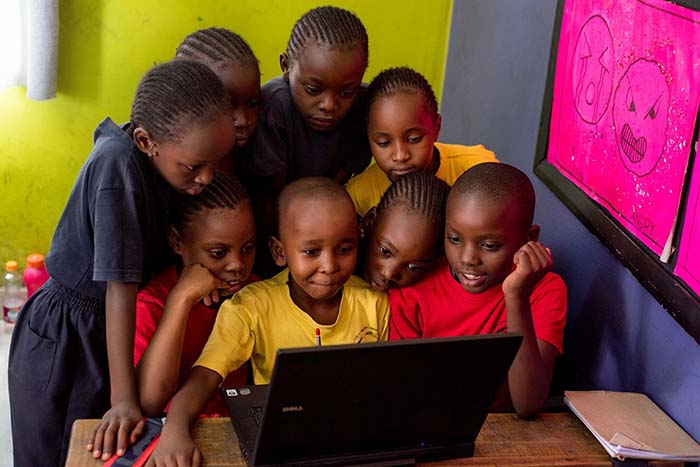Her fingers were flying over the keyboard. Among the 100 or so children gathered on that Saturday morning, she was the undisputed champion of Typing Turtle, a game designed to develop typing technique. Thanks to computers provided by KCEF, Josephine Nejeri, an 11-year-old living in the slums of Thika, had discovered something she excelled at. Skills she hadn’t known existed only three months before.
Feeding the hopes of the children we serve is among KCEF’s goals, and computers are among the tools helping us do that. In 2010, when we first began providing computers, KCEF thought of them as a way of offering learning activities for younger students. Learning activities like Typing Turtle were embedded in little laptops to teach, motivate and entertain.
 Watching Josephine exercise her lightning fast typing skills suggested the broader potential for computers to help students raise their eyes above their slum surroundings and glimpse the world of technology—technology that’s becoming more important every day. As a colleague watching her said, “Imagine if you could teach Josephine to code.”
Watching Josephine exercise her lightning fast typing skills suggested the broader potential for computers to help students raise their eyes above their slum surroundings and glimpse the world of technology—technology that’s becoming more important every day. As a colleague watching her said, “Imagine if you could teach Josephine to code.”
Today, KCEF schools are indeed exposing students to basic coding as well as other online learning. We are seeing lives and ambitions changed and enriched by our students’ experience with technology. Since 2010, we have provided 162 One Laptop Per Child XO computers (112 still in use) and 91 Android PC’s (82 still functioning). Given their hard use, with multiple students often pouring over one screen, the computers’ durability is remarkable.
When we introduced basic computer technology to KCEF schools, we had no idea that the Kenyan National Curriculum would soon begin requiring a technology unit.
Students from the Nairobi slums enjoy precious few advantages over others, but our computers have helped them and their teachers level the playing field.
KCEF teachers see the potential computers have for engaging students and feeding life changing hopes.
Teacher Florence, from Thika says,
“Our children have been exposed to creative computer activities like computer aided drawing and coding …. The government has recently incorporated coding as a unit which will be tested in the national exams. This program is timely!”
Teacher Macharia of Garissa Road Primary adds,
“Since the inception of the computer program, our children have enjoyed the computer classes. We have noted immense love for this program compared to any other activity in the school.”
Graduates of our primary schools who have gone on to secondary school and university have also emphasized how their goals have been shaped by KCEF computers. One example is Maxwel, who was first exposed to computers as a primary student at Kicoshep School in the Kibera slum.
Maxwel says,
“I am a freshman at KCA University. I developed an interest in computers in primary school and furthered my technical skills in high school. I set my mind to working in computer science as a career.”
Mary Njambi, a KCEF student from Thika who has gone on to high school says,
“I didn’t know the importance of the computer skills I had learned in primary school until I joined Form One (freshman year) and found out that computer is a compulsory subject. With the exposure I had it was easy…. I am thinking of pursuing business informatics which is a branch of computer science. Thank you so much for the opportunity.”
Finally, Amos Ngure, who also developed computer skills through KCEF’s program, is pursuing a Bachelor’s Degree in computer science at Mombasa University. He says,
“I am grateful for the chance I was given to learn computers early in class 7. The experience aroused my love for computing which has led me to pursue computer science as a major. I am committed to go back after my graduation to train more students in my locality. I am so thankful”.
When we ask kids in the slums what they want to be, they often say “a pilot.” Why such an extravagant goal? I think it’s because they look up from their slum surroundings and watch planes freely glide across the sky from nearby Jomo Kenyatta Airport and dream of mastering the technology that could free them from their poverty.
Maxwel, Mary and Amos have lowered their sights but not their ambitions, and thanks to KCEF’s computers, they have learned technology that will help fulfill their dreams.
Dear friends of KCEF, I invite you to help. A donation of $200 will support a school’s training session or provide online learning content. A donation of $250 will purchase a computer that might change a life forever. Please feed their hopes.
Gratefully,
Dick Cairns
Board Member

